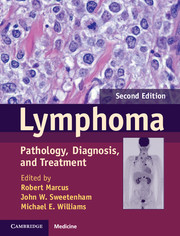Book contents
- Frontmatter
- Contents
- Preface to second edition
- Preface to first edition
- List of contributors
- 1 Epidemiology
- 2 Prognostic factors for lymphomas
- 3 Imaging
- 4 Clinical trials in lymphoma
- 5 Hodgkin lymphoma
- 6 Follicular lymphoma
- 7 MALT and other marginal zone lymphomas
- 8 Small lymphocytic lymphoma/chronic lymphocytic leukemia
- 9 Waldenström's macroglobulinemia/lymphoplasmacytic lymphoma
- 10 Mantle cell lymphoma
- 11 Burkitt and lymphoblastic lymphoma: clinical therapy and outcome
- 12 Therapy of diffuse large B-cell lymphoma
- 13 Central nervous system lymphomas
- 14 T-cell non-Hodgkin lymphoma
- 15 Primary cutaneous lymphoma
- 16 Lymphoma in the immunosuppressed
- 17 Atypical lymphoproliferative, histiocytic, and dendritic cell disorders
- Index
4 - Clinical trials in lymphoma
Published online by Cambridge University Press: 18 December 2013
- Frontmatter
- Contents
- Preface to second edition
- Preface to first edition
- List of contributors
- 1 Epidemiology
- 2 Prognostic factors for lymphomas
- 3 Imaging
- 4 Clinical trials in lymphoma
- 5 Hodgkin lymphoma
- 6 Follicular lymphoma
- 7 MALT and other marginal zone lymphomas
- 8 Small lymphocytic lymphoma/chronic lymphocytic leukemia
- 9 Waldenström's macroglobulinemia/lymphoplasmacytic lymphoma
- 10 Mantle cell lymphoma
- 11 Burkitt and lymphoblastic lymphoma: clinical therapy and outcome
- 12 Therapy of diffuse large B-cell lymphoma
- 13 Central nervous system lymphomas
- 14 T-cell non-Hodgkin lymphoma
- 15 Primary cutaneous lymphoma
- 16 Lymphoma in the immunosuppressed
- 17 Atypical lymphoproliferative, histiocytic, and dendritic cell disorders
- Index
Summary
Introduction
Clinical trials are the backbone of the development and advancement of therapeutic approaches. The pace of development of new agents, the regulatory overhead, the costs of data management, inclusion of quality-of-life assessments, radiologic assessments and central review, central pathology review, biospecimen acquisition, symptom-control assessments, and the evaluation of biologic correlates all present significant challenges for the future development of new therapeutic agents and regimens. As these therapeutic agents and approaches become increasingly targeted and the basic science, clinical risk factors, toxicities, and natural history of lymphomas broadens, the identification and assessment of relevant endpoints, be they clinical (e.g. physical examination, radiologic) or biologic (e.g. immunologic, genetic, metabolic, etc.), also becomes increasingly complex. In turn, the more complex the endpoints and the more targeted the regimens, the more challenges are presented when designing and conducting clinical trials and analyzing and interpreting the results. While this field of clinical trial design is too broad to give full discussion adequately in this chapter, the reader is referred to more extensive references on this area. Given the complexity of issues when designing, monitoring, interpreting, and analyzing data for a clinical trial, statistician input and collaboration is of paramount importance. This chapter will focus on the principles and details of clinical trials from the clinician perspective. As such, the fundamental considerations of clinical trial design as well as the types of trials conducted in clinical research will be reviewed.
- Type
- Chapter
- Information
- LymphomaPathology, Diagnosis, and Treatment, pp. 45 - 60Publisher: Cambridge University PressPrint publication year: 2013

